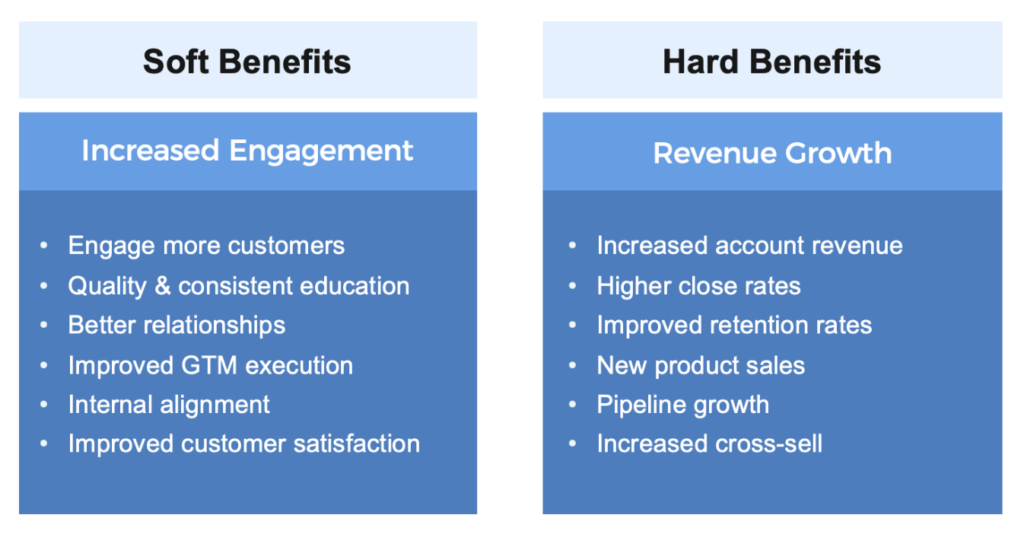Embracing the Digital Revolution
2023 is the year Digital Sales Rooms (DSRs) became the cornerstone of digital sales transformation. It’s been long overdue. The B2B market has grappled with abundant technology but has struggled to change due to the resistance to adopting a more innovative selling model.
Traditional selling models are ingrained into the fabric of companies, cultures, and processes. But they do not work with today’s digital-first customers. In 2023, we reached the tipping point where the pain of staying the same exceeded the pain of change. Simply put, we cannot sell the old way due to inconsistent and degrading revenue performance.
We cannot sell the old way due to degrading revenue performance.
As we turn the corner, 2024 emerges as a pivotal year for the widespread adoption of Digital Sales Rooms. In this blog we’ll delve into the industries, use cases, adoption trends, and value organizations deriving from Digital Sales Rooms. We will also spotlight Smart Rooms by JourneyDXP, the industry’s leading Digital Sales Room.
Industries at the Forefront
The adoption of Digital Sales Rooms is not confined to a specific industry; rather, it spans a broad spectrum of sectors. Digital Sales Rooms have generated the most interest and made the biggest impact in industries and companies with a key account or strategic account model.
Industries such as technology, consulting, manufacturing, finance, and healthcare are witnessing a surge in the implementation of these platforms. The flexibility of Digital Sales Rooms allows them to cater to the unique needs of each industry, making them an invaluable asset to engage customers and build relationships.
For instance, in the technology sector, Smart Rooms facilitate the seamless communication of complex technical details and product specifications. In manufacturing, these platforms are a dynamic space to manage existing programs and relationships and collaborate on innovative solutions by sharing educational materials, case studies, and product demonstrations. The finance industry benefits from secure document sharing and transaction tracking, ensuring compliance with regulatory standards.

Diverse Use Cases
Digital Sales Rooms are proving to be a versatile tool. Strategic or key accounts require engaging more than a dozen relationships across many diverse groups. The goal is to maintain engagement with relevant and timely content, even when the customers are not ready to buy. Engaging earlier helps to shape the customer priorities and provides a substantial advantage over competitors.
The various use cases all share the need to provide a centralized hub for all relevant content. Whether it is sales collateral, product demos, contracts, or pricing details, Smart Rooms streamline access, ensuring sales teams are well-equipped to engage clients effectively.
A popular use case is account-based marketing (ABM). Digital Sales Rooms serve as an immersive platform for presenting tailored content and a personalized experience to existing and potential new customers in a private and secure space. These rooms enable marketers to create engaging presentations, incorporating multimedia elements that captivate and inform prospects. The collaborative nature of these platforms fosters deeper engagement, making a lasting impression.
Adoption Trends
As businesses strive to stay ahead in an increasingly competitive market adoption of Digital Sales Rooms is gaining momentum. The ease of integration, user-friendly interfaces, and the tangible benefits they bring to key account management are driving this surge in adoption. Sales teams recognize the efficiency gains and enhanced collaboration that Smart Rooms offer, making them integral to their daily workflows.
The global shift towards remote work has accelerated the adoption of Digital Sales Rooms. With teams scattered across various locations, having a centralized platform like Smart Rooms becomes imperative for maintaining consistency in communication and collaboration. This trend is expected to continue as businesses prioritize flexibility and efficiency in their operations.
The Value of Digital Sales Rooms
Smart Rooms demonstrated an increase in closing rates from 28% to 44%.
A 2023 Study of Smart Rooms demonstrated an increase in closing rates from 28% to 44%. When you look inside the numbers, it supports the core value that digital sales rooms make it easier to sell and easier to buy. Moreover, Digital Sales Rooms contribute to shortened sales cycles, improve cross-sell rates, and increase retention. By centralizing information and streamlining communication, sales teams can navigate the sales process more efficiently, leading to quicker decision-making from clients. This not only improves the overall customer experience but also positively impacts the bottom line.
Organizations realize that without Digital Sales Rooms, it is more difficult to sell and retain customers – the cost of marketing and selling increases while revenue performance decreases. Smart Rooms provide a variety of benefits as noted below:

JourneyDXP’s Smart Rooms: Leading the Charge
In the landscape of Digital Sales Rooms, JourneyDXP’s Smart Rooms stand out as the industry leader. Built natively on Salesforce.com, Smart Rooms seamlessly integrates with one of the most widely used CRM (Customer Relationship Management) platforms, providing a cohesive experience for marketing, sales, and account teams. This integration ensures that all data is managed and secured in Salesforce, eliminating silos, and enhancing overall security and efficiency.
Smart Rooms offer a range of features that set them apart, including account personalization, automation, robust analytics, GenAI (Generative AI), real-time collaboration, and advanced customization options. The platform’s ability to adapt to the unique needs of different industries makes it a versatile solution for organizations of all sizes.
Conclusion
Digital Sales Rooms bring together the art and science of selling. Sales consultants and trainers will often state: “It’s not what you sell but how you sell.” In today’s world of information overload, we need great solutions AND to sell better by making the buying process easier.
As we navigate the complexities of B2B marketing and sales in 2024, Digital Sales Rooms emerge as a transformative force in strategic account and key account management. The diverse use cases, widespread adoption across industries, and the substantial value they bring to organizations highlight their significance in the digital era.
JourneyDXP’s Smart Rooms, with its integration with Salesforce.com, stands as a testament to the evolution of Digital Sales Rooms by empowering businesses to stay agile, competitive, and customer-focused in the dynamic landscape of 2024. The journey towards digital transformation has only just begun, and embracing the power of Digital Sales Rooms is undoubtedly a step in the right direction.
POPULAR
The Imperative Alignment of Sales and Marketing in the Digital Age
In today's hyperconnected and rapidly evolving business, communications, and technology landscape, the convergence of sales and marketing functions has become more pronounced than ever before. Alignment between sales and marketing teams has emerged as a critical determinant of success. This blog delves into why it has become more essential than ever for sales and marketing teams to be fully aligned in their prospect and customer engagement strategy and explores how digital sales rooms serve as potent tools in facilitating this alignment and fostering enhanced customer engagement.
RELATED
4 B2B Business Development Strategies Rooted In Thoughtfulness
Business development (and business development reps, also known as BDRs) get a bad rap. They’re traditionally viewed as the cold callers; the folks who chip away at a mountain of email addresses and phone numbers...




